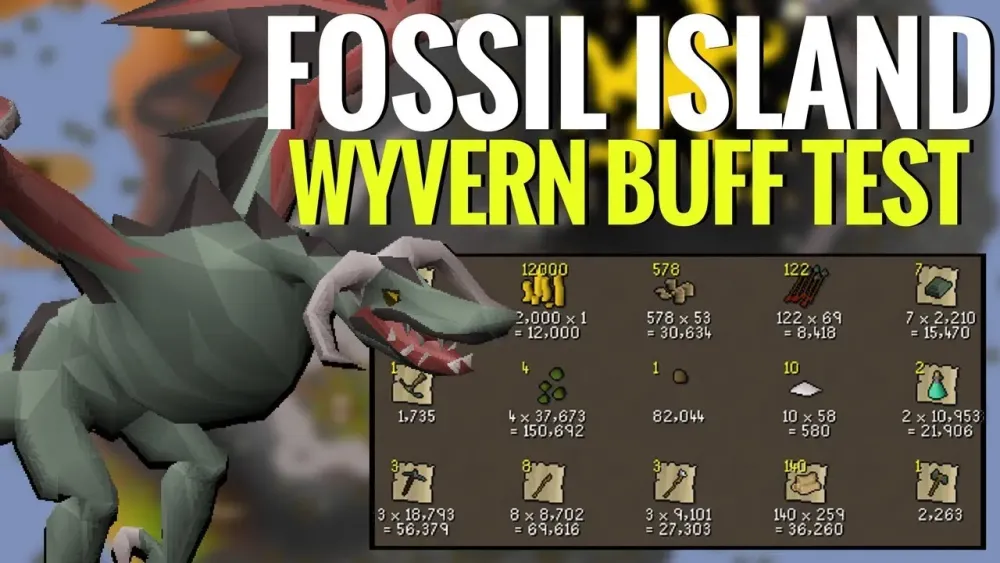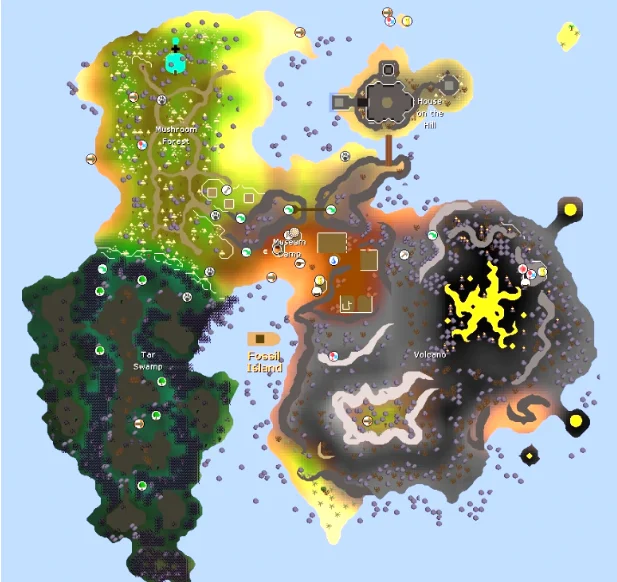Your cart is empty
Fossil Island Chest OSRS Ultimate Guide for Players

Fossil Island in Old School RuneScape (OSRS) is a treasure trove of unique activities, and one of its intriguing features is the stone chest located in the House on the Hill. These chests offer players a chance to collect notes for the Fossil Island Note Book, uncover lore, and engage in a distinctive gameplay mechanic. Whether you’re a seasoned adventurer or a curious newcomer, this guide dives deep into everything you need to know about the Fossil Island chest, from accessing it to maximizing your rewards.
The stone chests in the House on the Hill are a key attraction on Fossil Island, a members-only area northeast of Morytania. These chests, accessible after completing the Bone Voyage quest, require numulites to unlock and offer a mix of outcomes—notes for your Fossil Island Note Book, minor damage, or nothing at all. Their allure lies in the lore-heavy notes and the chance to complete your note book, making them a must-try for players invested in Fossil Island’s mysteries.
Location and Access
The chests are found in the basement of the House on the Hill, accessible via a trapdoor in the southeast corner. To reach Fossil Island, you must complete the Bone Voyage quest, which requires at least 100 kudos with the Varrock Museum. The fastest way to travel is using a digsite pendant, which teleports you near the barge at the Digsite. Alternatively, use the Glider and Spirit Tree systems for a slightly longer but viable route.
Requirements for Using the Chest
To interact with the stone chests, you need:
- Bone Voyage Quest: Grants access to Fossil Island.
- Numulites: The in-game currency used to unlock the chests (100 numulites per attempt).
- Fossil Island Note Book: Obtained from the Junior Navigator post-quest to store notes found in the chests.
How the Fossil Island Chest Works

The mechanics of the stone chest are straightforward but come with an element of chance. Each chest requires a single numulite to initiate a search, followed by an option to insert 100 numulites for a chance at rewards. According to Jagex, each outcome has a 1/3 probability: receiving a note, taking minor damage, or getting nothing.
Possible Outcomes
When you insert 100 numulites, you face one of three outcomes:
- Note for Fossil Island Note Book: Adds lore-rich notes to your note book, enhancing your understanding of the island’s history.
- Minor Damage: Deals a small amount of damage to your character, which can be mitigated with high hitpoints or healing items.
- Nothing Happens: No reward or penalty, just a loss of 100 numulites.
Note Book Integration
The notes you collect are added to the Fossil Island Note Book, a unique item that documents your findings on the island. These notes appear after your personal activity logs and are purely for lore, offering no direct gameplay benefits like experience or items. If you lose your note book, you can reclaim it from the Fossil Collector, shopkeeper, or a player-owned house bookcase.
Strategies for Efficient Chest Farming
Maximizing your time with the Fossil Island chests involves careful preparation and resource management. Since numulites are the key currency, you’ll want to farm them efficiently and approach the chests strategically to collect all possible notes.
Farming Numulites
Numulites can be obtained through various activities on Fossil Island. Here are the most efficient methods:
- Volcanic Mine: Yields a high number of numulites, especially with a team.
- Sulliuscep Mushroom Cutting: Requires 65 Woodcutting and offers numulites alongside fossils.
- Underwater Agility/Thieving: Looting clams and chests underwater provides numulites and mermaid tears, which can be traded for numulites at Mairin’s Market.
Pro Tip: Store numulites in the bank chest near the Museum Camp (requires 21 Construction to build) to avoid inventory clutter.
Managing Risks
The minor damage from the chests is negligible for high-level players but can add up for those with lower hitpoints. Bring a few pieces of food (e.g., monkfish) or use the Redemption prayer to minimize health risks. If you’re farming notes for hours, consider banking frequently to restock numulites and heal.
Rewards and Their Value
The primary reward from the stone chests is the notes for the Fossil Island Note Book. While these don’t offer tangible rewards like experience or gold, they’re a completionist’s dream, adding depth to the game’s lore. Additionally, the House on the Hill basement contains a pile of books that can yield an ancient diary, another lore item.
Is It Worth It?
The value of farming the chests depends on your goals:
| Goal | Value |
|---|---|
| Lore Completion | High – Essential for filling the Fossil Island Note Book. |
| Experience or Profit | Low – No direct XP or gold rewards. |
| Fun/Exploration | Moderate – Engaging for players who enjoy RNG-based activities. |
If you’re not a lore enthusiast, you might find other Fossil Island activities, like Sulliuscep cutting or Volcanic Mine, more rewarding due to their experience and numulite gains.
Comparison with Other Fossil Island Activities
Here’s how the stone chest stacks up against other Fossil Island tasks:
- Sulliuscep Cutting: High Woodcutting XP (up to 100,000/hour) and fossils/numulites, but requires 65 Woodcutting.
- Underwater Agility/Thieving: Up to 30,000 Agility XP and 110,000 Thieving XP per hour, plus fossils and numulites.
- Volcanic Mine: Great for Mining XP and numulites, but team coordination is needed for efficiency.
The chests are less efficient for skilling but unique for their lore focus, making them a niche activity.
Tips and Tricks for Success
To make the most of your time with the Fossil Island chests, consider these practical tips:
Optimize Travel
Use a digsite pendant enchanted at the House on the Hill’s strange machine to teleport directly to the house. Combine this with the Mycelium Transportation System (Magic Mushtrees) to move quickly between the chests and other island locations.
Track Your Notes
Keep a mental or written note of which notes you’ve collected, as the chests won’t yield duplicates once you’ve obtained all available notes. This helps you decide when to stop farming the chests.
Combine with Other Activities
Since the chests don’t offer XP or profit, pair your chest runs with nearby tasks like checking birdhouses or hunting herbiboars in the Mushroom Forest. This maximizes your time on the island.
Community Insights
Reddit discussions (e.g., r/2007scape) suggest numulites cost 400–750 GP each when the chests were first introduced, but prices fluctuate. Check the Grand Exchange for current rates to budget your chest attempts. Community feedback also highlights the chests’ RNG nature, so patience is key.
In conclusion, the Fossil Island stone chests offer a unique, lore-driven experience in OSRS, perfect for players who enjoy unraveling Gielinor’s mysteries. While they lack direct rewards like XP or gold, their role in completing the Fossil_serializer Island Note Book makes them a compelling activity for completionists. By farming numulites efficiently, managing risks, and optimizing your travel, you can make the most of this intriguing feature. So, grab your digsite pendant, stock up on numulites, and dive into the ancient secrets of Fossil Island!

